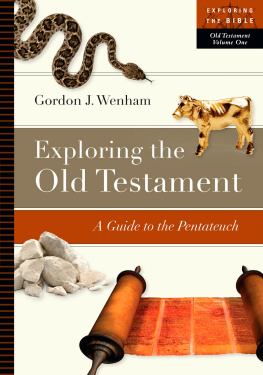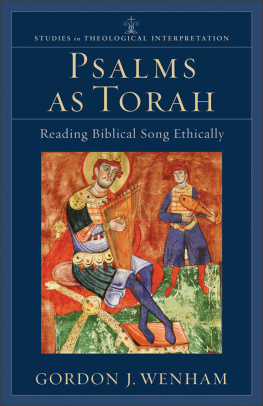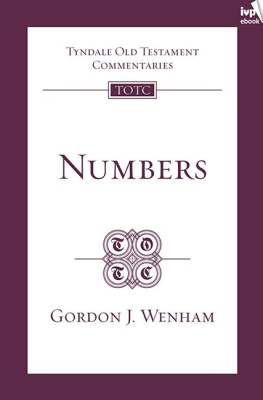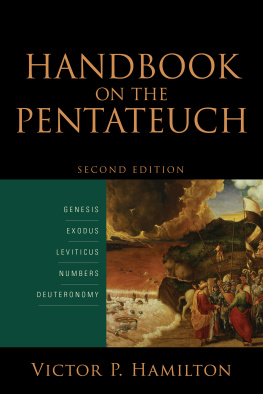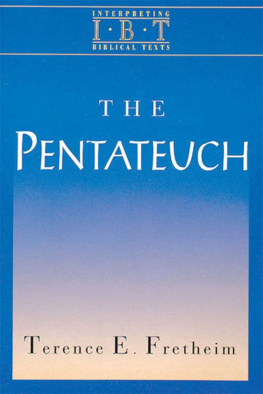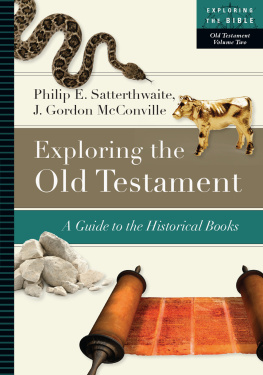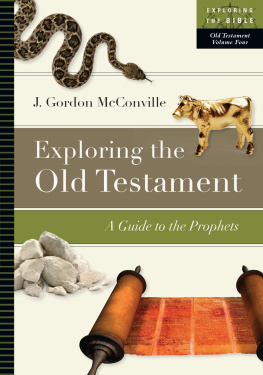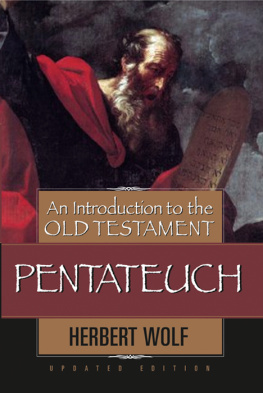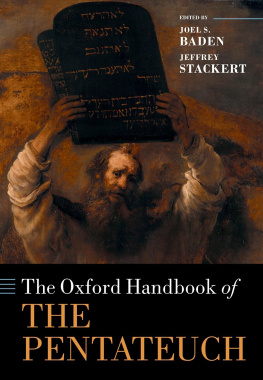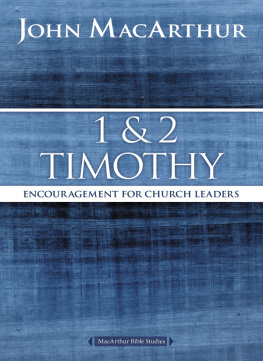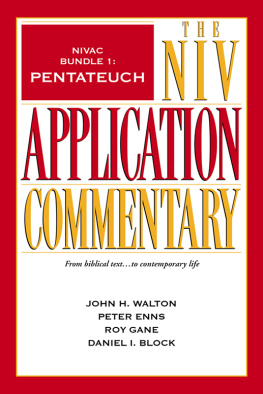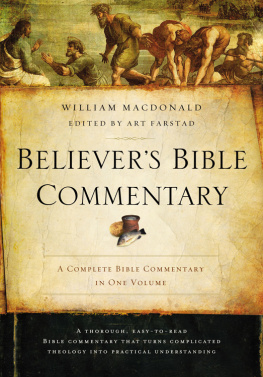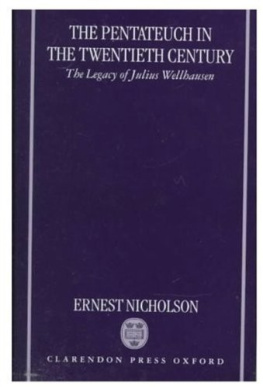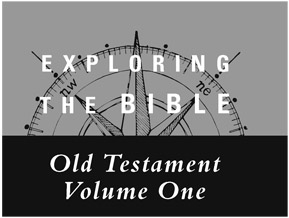EXPLORING
THE OLD
TESTAMENT
Volume 1
The Pentateuch
Gordon Wenham studied theology at Cambridge, London (Kings College), Jerusalem (Ecole Biblique) and Harvard University (USA). He lectured at Queens University, Belfast (197081) before moving to Cheltenham, where he is professor of Old Testament at the University of Gloucestershire. He has written a thesis on Deuteronomy and commentaries on Genesis, Leviticus and Numbers as well as numerous articles in scholarly journals. He chairs the Tyndale Fellowship Old Testament Study Group. He is married and has four children. His hobbies include gardening, cycling and Jewish affairs.
Exploring the Old Testament
The Pentateuch by Gordon Wenham
The Historical Books by Philip Satterthwaite and Gordon McConville
The Psalms and Wisdom Literature by Ernest Lucas
The Prophets by Gordon McConville
Exploring the New Testament
The Gospels and Acts by David Wenham and Steve Walton
The Letters and Revelation by Howard Marshall, Stephen Travis and Ian Paul
Exploring the
Old Testament
A Guide to the Pentateuch
Gordon J. Wenham
InterVarsity Press
P.O. Box 1400, Downers Grove, IL 60515-1426
ivpress.com
Copyright Gordon J. Wenham 2003
Published in the United States of America by InterVarsity Press, Downers Grove, Illinois, with permission from the Society for Promoting Christian Knowledge, London, England.
All rights reserved. No part of this book may be reproduced in any form without written permission from InterVarsity Press.
InterVarsity Press is the book-publishing division of InterVarsity Christian Fellowship/USA, a movement of students and faculty active on campus at hundreds of universities, colleges and schools of nursing in the United States of America, and a member movement of the International Fellowship of Evangelical Students. For information about local and regional activities, visit intervarsity.org.
Scripture quotations, unless otherwise noted, are from The Holy Bible, English Standard Version, copyright 2001 by Crossway Bibles, a division of Good News Publishers. Used by permission. All rights reserved.
Cover design by Cindy Kiple
Images: golden calf: Tuned_In/iStockphoto snake: texcroc/iStockphoto
parchment scrolls: DanGonzalez/iStockphoto pile of rocks: Alasdair Thomson/iStockphoto compass: lublubachka/iStockphoto
ISBN 978-0-8308-7008-0 (digital)
ISBN 978-0-8308-5309-0 (print)
This digital document has been produced by Nord Compo.
KEY TO PANELS
This key to the panels helps locate the special and suggested exercises that occur throughout the volume. It should be noted that the panels are not exhaustive treatments of topics, and are meant to be read and used in their contexts.
WHAT DO YOU THINK? PANELS
DIGGING DEEPER PANELS
OTHER PANELS
PREFACE
Exploring the Old Testament is designed to help the beginning student understand the writings of the Old Testament. It serves the purpose of an introduction, but its unique format is devised to make the volumes accessible to the modern reader. EOT engages with the reader, by interspersing interactive panels with the main text. These panels ask for responses, suggest lines of thought, give further information, or indicate ways in which particular topics might be followed up in more depth. This design aims to make the volumes useful either for independent study or as a class text.
EOT aims to show the relevance of Old Testament study both to theology and to modern life. Its four authors, each writing in areas in which they have previously published extensively, believe that the Old Testament has foundational significance for theology and Christian belief and practice.
For that reason EOT expressly aims to incorporate modern approaches to interpreting the text. While the traditional historical questions are given their due place, newer approaches such as canonical and rhetorical criticism are represented. It is hoped that this will enable the student to see the potential applications of the books of the Old Testament to modern life.
EOT is a companion series to Exploring the New Testament.
Gordon McConville
Series editor
ACKNOWLEDGEMENTS
I should like to thank Ruth McCurry, Gordon McConville and Alan Millard for their advice and encouragement and my son Christopher for the maps and graphics.
INTRODUCTION
The first five books of the Bible, often called the Pentateuch, are fundamental to the faith of both Christians and Jews. These books contain the familiar stories of creation, the fall and the flood. They tell of the origins of the human race and of the Jewish people. They include laws as basic as the Ten Commandments and as complex as the regulations for food and sacrifices. These books relate the call of Israel to be Gods chosen people, yet hold out the prospect of universal salvation for all mankind. So profound has been the influence of these books on Western culture that their ideas are embedded in our language and ideology at point after point.
Yet anyone picking up a Bible and starting to read Genesis for the first time will soon be surprised, puzzled and sometimes shocked, for despite the Pentateuchs foundational role in our culture, its ideas often seem utterly alien to the modern reader. Its approach to chronology, history, ethics and God challenge the modern world view at so many points that readers may be tempted to stop reading very quickly. But this would be a great mistake. The Pentateuch is a fascinating world, which deserves to be explored carefully and sympathetically. And this is what this volume tries to do.
Exploring the Old Testament is the general title of this series, and this first volume will try to guide you through the Pentateuch so that you can appreciate what it was trying to say to its first readers and why it should still be of interest to people living in the twenty-first century. I shall introduce you to the social world of the Bible, to its marriage customs, national festivals, welfare systems and legal ideals. I shall endeavour to illuminate the relationship between Israel and the surrounding cultures, the subtle mix of dependence and originality that characterizes the Pentateuchs use of ancient Near Eastern ideas. We shall look at some of the literary techniques used in the Pentateuch, its love of symmetrical patterns and its rhetorical devices. But pre-eminently the Pentateuch speaks of God and his relationship to Israel mediated by Moses, so in exploring the book we shall try to come to terms with its theology, its ideas about God, its religious practices, its concepts of faith, obedience and loyalty.
But a guide to the Pentateuch needs to be more than a description of what is there: it needs to explain something of the history of the study of the Pentateuch, of how scholars have come to understand it in the way they now do. It therefore contains, at various points, summaries of current scholarly debates, e.g. on patriarchal religion, or notes on recent archaeological discoveries. The later chapters of the book contain a more extended discussion of the composition of the Pentateuch, an issue that has been more fully debated by biblical scholars than any other topic. My treatment does not pretend to be comprehensive, just to give the first-time reader some bearings in a most complicated discussion.

